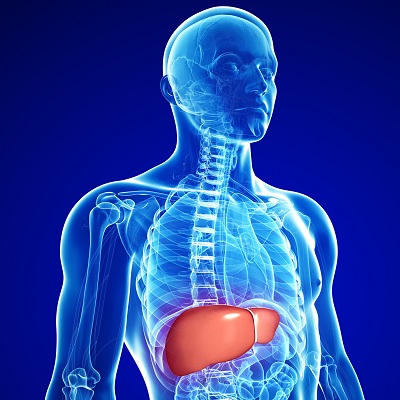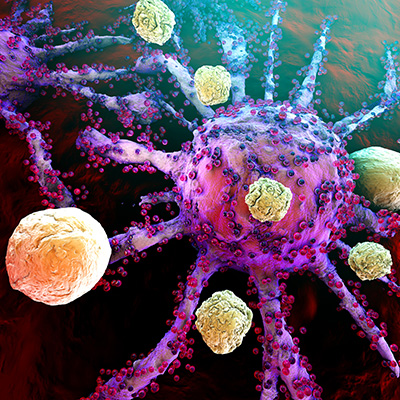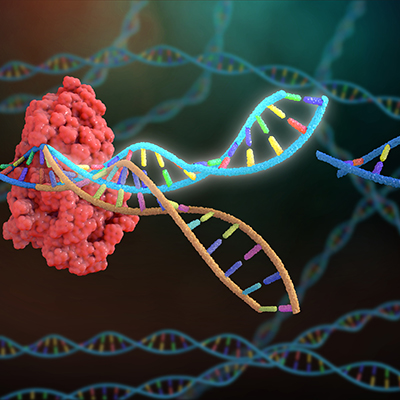 Reanalysis of old data reveals overlooked liver gene therapy vector with better properties
Reanalysis of old data reveals overlooked liver gene therapy vector with better properties
Rational design and directed evolution have created an adeno-associated virus (AAV) capsid that is better at targeting the liver, setting the stage for its use as a gene therapy vector. Read More
 Dialing down activity of Cas enzyme improves safety of CRISPR gene editing in mice
Dialing down activity of Cas enzyme improves safety of CRISPR gene editing in mice
Scientists have modified the synthetic guide RNA (gRNA) that enables CRISPR-Cas gene editing to make the process safer for use in humans. Read More
 CRISPR/Cas9 mouse model reveals cellular function changes that drive rare disease
CRISPR/Cas9 mouse model reveals cellular function changes that drive rare disease
A CRISPR/Cas9 mouse model has shown how mutations that cause a rare disease affect cellular function, shedding light on how to monitor and treat the condition in the process. Read More
 At SLAS 2023, companies showcase, launch advanced automation and screening technologies
At SLAS 2023, companies showcase, launch advanced automation and screening technologies
At the Society for Laboratory Automation and Screening (SLAS) 2023 International Conference and Exhibition, being held in San Diego from February 25 to March 1, numerous firms have announced that they are showcasing emerging technologies for advanced life science applications. Read More
 Beckman Coulter, Sciex collaborate on high-throughput screening workflows
Beckman Coulter, Sciex collaborate on high-throughput screening workflows
Life science analytical technologies company Sciex on Monday announced a collaboration with Beckman Coulter Life Sciences to provide comprehensive workflows for high-throughput screening; high-throughput absorption, distribution, metabolism, and excretion (HT-ADME); and synthetic biology studies. Read More
 Algorithm predicts success of next-generation CRISPR edits, advancing push to treat genetic diseases
Algorithm predicts success of next-generation CRISPR edits, advancing push to treat genetic diseases
A machine learning algorithm has predicted the chances of successfully inserting a gene-edited sequence of DNA into a cell using a next-generation CRISPR-Cas9 approach. Read More
 Newborn screening for neuromuscular disorder leads to improved outcomes in Australian study
Newborn screening for neuromuscular disorder leads to improved outcomes in Australian study
Newborn screening for spinal muscular atrophy (SMA) improves outcomes by enabling timely access to disease-modifying therapy, a prospective study published in the Lancet Child & Adolescent Health found. Read More
 T-cell therapy fights viral infections following stem cell transplants
T-cell therapy fights viral infections following stem cell transplants
Baylor College of Medicine and Washington University School of Medicine researchers studied posoleucel, an investigational off-the-shelf T-cell therapy that simultaneously targets six different viruses. The results, published January 11 in the journal Clinical Cancer Research, showed promising antiviral efficacy and safety in a phase II clinical trial of patients who had undergone stem cell transplantation to treat blood diseases including cancer. Read More
 Discovery of destructive CRISPR enzyme opens diagnostic, therapeutic applications for molecular scissors
Discovery of destructive CRISPR enzyme opens diagnostic, therapeutic applications for molecular scissors
The discovery of a CRISPR enzyme that destroys DNA and RNA in target cells has unlocked opportunities to use molecular scissors in diagnostics and to selectively destroy diseased cells. Read More
 Cancer-killing vaccine may also prevent brain cancer
Cancer-killing vaccine may also prevent brain cancer
Harvard Stem Cell Institute scientists are harnessing a new method of turning cancer cells into potent, anti-cancer agents. Their new cell therapy approach to eliminating established tumors also trains the immune system to prevent cancer from recurring, providing long-term immunity. The NIH-funded study, published January 4 in Science Translational Medicine, showed promising results when the approach was tested on mice with glioblastoma, a deadly brain cancer. Read More
Conferences
Science Briefs
Member Rewards
Earn points for contributing to market research. Redeem your points for merchandise, travel, or even to help your favorite charity.
Research Topics
Interact with an engaged, global community of your peers who come together to discuss their work and opportunities.
Connect
Tweets by @ScienceBoard






